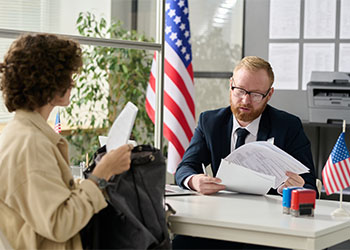What to Expect at the Naturalization Interview
Dec. 5, 2023
 The path to becoming a U.S. citizen can be filled with anticipation, excitement, and understandably, a bit of anxiety—especially when it comes to the naturalization interview. This pivotal step in the citizenship process is often shrouded in uncertainty for many applicants, raising questions about what to expect, how to prepare, and what repercussions an unsuccessful interview might have.
The path to becoming a U.S. citizen can be filled with anticipation, excitement, and understandably, a bit of anxiety—especially when it comes to the naturalization interview. This pivotal step in the citizenship process is often shrouded in uncertainty for many applicants, raising questions about what to expect, how to prepare, and what repercussions an unsuccessful interview might have.
Enter the Savage law, a dependable law firm that offers guidance in the complex world of immigration law. Located in Providence, Rhode Island, and serving clients throughout the state as well as Boston, Massachusetts, and the surrounding area, the firm is committed to providing comprehensive legal support to individuals navigating the intricate process of naturalization.
The Naturalization Interview
The naturalization interview is a crucial part of the process of becoming a U.S. citizen. This meeting with a USCIS officer involves an in-depth review of your application and background. Here's what you can expect:
Questioning: The USCIS officer will ask you questions about your Application for Naturalization (Form N-400) and your background. They'll check for accuracy and gauge your ability to speak and understand English.
English Test: This portion of the interview assesses your ability to speak, read, and write in English. It's not merely about language fluency; it's also a way to determine your understanding of the U.S. government and history.
Civics Test: The civics test is a quiz about American government and history. Depending on when you filed your Form N-400, you'll either take the 2008 or 2020 version of the civics test. The 2008 version includes 100 questions, and you must answer six correctly to pass.
Retesting: If you fail any part of the test during your initial interview, don't worry. You'll be retested on the failed portion within 60 to 90 days. Recent policy changes may allow some applicants to choose between the 2008 or 2020 version of the civics test at their re-exam.
Study Materials: To help you prepare for the naturalization test, there are various study materials and resources available. These materials can be a valuable tool to ensure you're well-prepared for both the English and civics tests.
Remember, the Savage law is here to assist you throughout this process. With extensive experience in immigration law, Attorney Layne C. Savage can provide legal guidance and represent you in immigration hearings.
Preparing for Your Interview
Preparation is key for a successful naturalization interview. Here are some crucial steps to follow:
Review your application: Familiarize yourself with the information you've provided, as this will be the basis for many of the USCIS officer's questions.
Bring necessary documents: These include your appointment notice, permanent resident card, valid and expired passports, and state-issued identification card, such as a driver’s license.
Provide evidence of your marital status: This could be a marriage certificate, divorce decree, or death certificate of a former spouse.
Show any name changes: If you've legally changed your name, bring the appropriate documentation.
Present your spouse's prior marital history: If applicable, bring documents showing previous marriages were terminated.
Provide court dispositions in criminal cases: If you've been arrested, these are essential.
Men aged 18-31 should bring selective service registration: This is required for this age group.
Getting legal guidance from a dependable attorney can be extremely beneficial when navigating a naturalization interview.
Legal Guidance When You Need It Most
The naturalization process can be overwhelming, but you don't have to go through it alone. The Savage law is dedicated to providing the legal guidance you need to get through this journey. With the knowledge of attorney Layne C. Savage, you'll receive personalized support tailored to your unique circumstances, bolstering your confidence and readiness for your naturalization interview. Reach out today to schedule a consultation and take the next step toward securing your future as a U.S. citizen.
